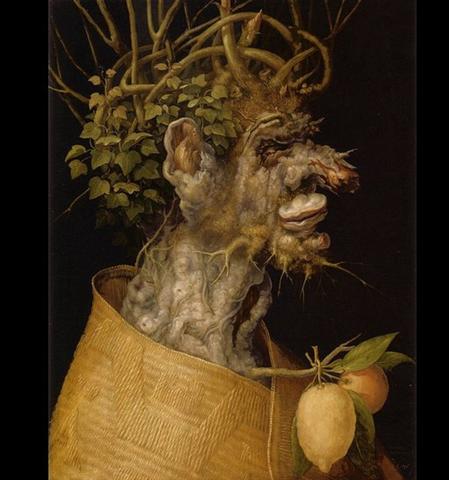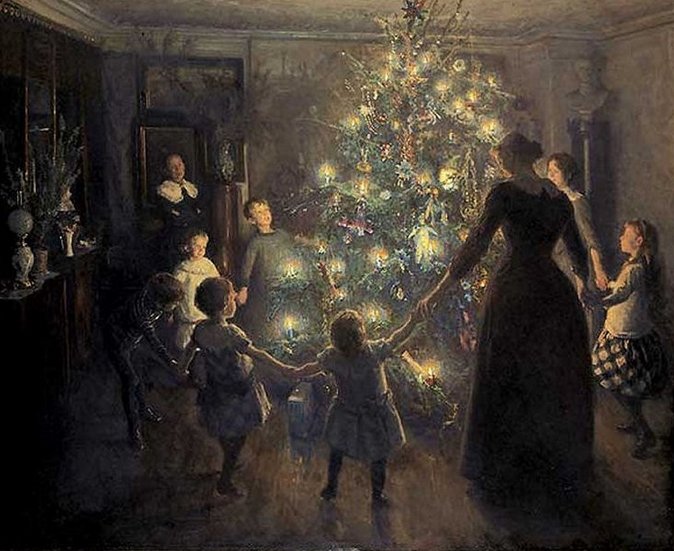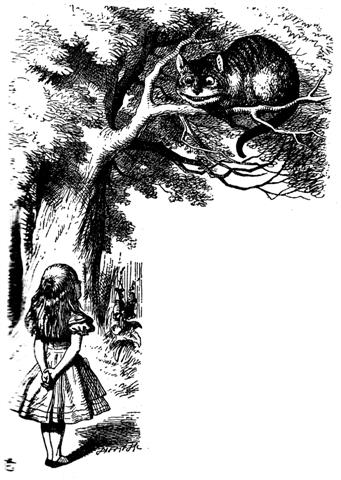Archimboldo has in plain view for us all to see exhibited a pair of fresh fruits hanging down like breasts in front under the rotten head of 'the old calabash' - sticking out his neck as from a turtle's carapace, out from the beautifully plaited harvest basket:
... Gronw Pebyr, who figures as the lord of Penllyn - 'Lord of the Lake' - which was also the title of Tegid Voel, Cerridwen's husband, is really Llew's twin and tanist ... Gronw reigns during the second half of the year, after Llew's sacrificial murder; and the weary stag whom he kills and flays outside Llew's castle stands for Llew himself (a 'stag of seven fights'). This constant shift in symbolic values makes the allegory difficult for the prose-minded reader to follow, but to the poet who remembers the fate of the pastoral Hercules the sense is clear: after despatching Llew with the dart hurled at him from Bryn Kyvergyr, Gronw flays him, cuts him to pieces and distributes the pieces among his merry-men. The clue is given in the phrase 'baiting his dogs' ... ... As has already been mentioned, the Delphians worshipped Dionysus once a year as the new-born child, Liknites, 'the Child in the Harvest Basket', which was a shovel-shaped basket of rush and osier used as a harvest basket, a cradle, a manger, and a winnowing-fan for tossing the grain up into the air against the wind,
to separate it from the chaff ... I think the little nipple at the bottom of Archimboldo's right breast (yellow lemon) resembles the little knob at bottom of such glyphs as in tamaiti (little child, offspring):
And the lower half of the little turtle without legs at the Trail of the Garment in Andromeda also has the outline of a lemon:
Citrus fruits were necessary (vital) on long sea voyages because they carried the proper vitamines. There were seeds inside. ... And We caused to grow, over him, a spreading plant of the gourd kind ... ... Ipu is the Tahitian word corresponding to hipu. Mahigo means 'children'. I can translate the words of Bishop Jaussen into: The children (Mahigo) and the small calabashes are here mentioned together. In their prayers, when asking Makemake for small calabashes, it was especially children who were meant ... There were different views as to what the essential fruit-bearing Tree should be like.
... The state of the tree loomed large in their thoughts, because it came about at the same time the head of One Hunaphu was put in the fork. The Xibalbans said among themselves: 'No one is to pick the fruit, nor is anyone to go beneath the tree', they said. They restricted themselves, all of Xibalba held back. It isn't clear which is the head of One Hunaphu; now it's exactly the same as the fruit of the tree. Calabash came to be its name, and much was said about it. A maiden heard about it, and here we shall tell of her arrival. And here is the account of a maiden, the daughter of a lord named Blood Gatherer. And this is when a maiden heard of it, the daughter of a lord. Blood Gatherer is the name of her father, and Blood Moon is the name of the maiden. And when he heard the account of the fruit of the tree, her father retold it. And she was amazed at the account: I'm not acquainted with that tree they talk about. It's fruit is truly sweet! they say, I hear, she said. Next, she went all alone and arrived where the tree stood. It stood at the Place of Ball Game Sacrifice. What? Well! What's the fruit of this tree? Shouldn't this tree bear something sweet? They shouldn't die, they shouldn't be wasted. Should I pick one? said the maiden. And then the bone spoke; it was there in the fork of the tree: Why do you want a mere bone, a round thing in the branches of a tree? said the head of One Hunaphu when it spoke to the maiden. You don't want it, she was told. I do want it, said the maiden. Very well. Stretch out your right hand here, so I can see it, said the bone. Yes, said the maiden. She stretched out her right hand, up there in front of the bone. And then the bone spit out its saliva, which landed squarely in the hand of the maiden. And then she looked in her hand, she inspected it right away, but the bone's saliva wasn't in her hand. It is just a sign I have given you, my saliva, my spittle. This, my head, has nothing on it - just bone, nothing of meat. It's just the same with the head of a great lord: it's just the flesh that makes his face look good. And when he dies, people get frightened by his bones. After that, his son is like his saliva, his spittle, in his being, whether it be the son of a lord or the son of a craftsman, an orator. The father does not disappear, but goes on being fulfilled. Neither dimmed nor destroyed is the face of a lord, a warrior, craftsman, an orator. Rather, he will leave his daughters and sons. So it is that I have done likewise through you. Now go up there on the face of the earth; you will not die. Keep the word. So be it, said the head of One and Seven Hunaphu - they were of one mind when they did it ... The central element in Cb1-6 is a kind of Tree (rakau), this we can deduce from the design of the glyph type hua poporo - where the quartet of 'fruits' resembles the arrangement in the breadfruit (kuru, ulu):
|











